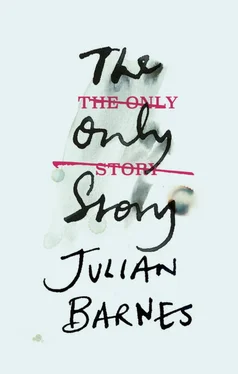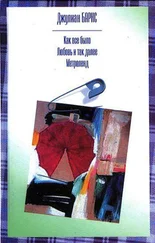Because there are still many good hours, and good days, when sobriety and cheerfulness fill the house, and her eyes and smile are just as they were when you first met, and you do something simple like drive for a walk in the woods, or go to the cinema and hold hands, and a sudden rush of feeling tells you it is all very easy and straightforward, and then your love is reaffirmed, yours for her, hers for you. And you wish you could display her to your friends at times like this: look, she is still herself, not just ‘underneath’, but here, now, on the surface too. You never suspect that one reason your friends tend to see her half-cut might be because she has persuaded herself, by some tortuous argument, that she needs a little Dutch courage before facing them.
Each stage rolls seamlessly into the next. And here comes a paradoxical one that you initially struggle with. If you love her, as you unwaveringly do, and if loving her means understanding her, then understanding her must include understanding why she is a drinker. You run through all her pre-history, and recent history, and current situation, and possible future. You understand all this, and before you know where you are, you have passed somehow from total denial of the fact that she drinks to total comprehension of why she might do so.
But with this comes a brute chronological fact. As far as you know, Susan only drank occasionally in all her years with Macleod. But now that she is living with you, she is – has become, is still becoming – an alcoholic. There is too much in this for you to entirely acknowledge, let alone bear.
She is sitting up in her quilted bedjacket, the newspapers around her, at her elbow a mug of coffee long gone cold. She has a frown on her, and her chin is pushed forward, as if she has been ruminating all day. It is now six in the evening, and you are in your last year of law studies. You sit on the side of her bed.
‘Casey Paul,’ she begins, in an affectionate, puzzled tone, ‘I’ve decided that there’s something seriously wrong.’
‘I think you may be right,’ you answer quietly. At last, you think, perhaps this is the moment of breakthrough. That’s what’s meant to happen, isn’t it? Everything comes to a moment of crisis, and then the fever breaks, and all becomes clear and rational and happy again.
‘But I’ve been searching my wits all day and can’t get a handle on it.’
Now where do you go? Do you start straight in again with the drinking? Suggest seeing the doctor again, a specialist, a psychiatrist? You are twenty-five, and quite untrained for this kind of situation. There are no articles in the newspaper headed, ‘How to Cope With Your Middle-Aged Female Alcoholic Lover’. You are on your own. You have no theories of life yet, you only know some of its pleasures and pains. You still believe, however, in love, and in what love can do, how it can transform a life, indeed the lives of two people. You believe in its invulnerability, its tenacity, its ability to outrun any opponent. This, in fact, is your only theory of life so far.
So you do the best you can. You take one of her wrists, and talk about how you met and fell in love, how you were chosen by lot and then threw in your lot together, how you had run away in the finest tradition of lovers, and you continue like this, meaning and believing every word, and then you gently suggest that she’s been drinking a little too much lately.
‘Oh, you’re always going on about that,’ she replies, as if this were some tedious and pedantic obsession of yours, nothing really to do with her. ‘But if you want me to say so, then I will. Maybe I occasionally take a drop or two more than is good for me.’
You quell the prompting inner voice which says: No, not a drop or two, a whole bottle or two more than is good for you.
She goes on, ‘I’m talking about something much bigger than that . I think there’s something seriously wrong.’
‘You mean, something that causes your drinking? Something I don’t know about?’ Your mind heads towards some terrible, defining event in her childhood, much worse than a ‘party kiss’ from Uncle Humph.
‘Oh, you really can be a Great Bore at times,’ she says mockingly. ‘No, much more important than that. What’s behind it all.’
You are already losing a little patience. ‘And what do you think might be behind it all?’
‘Maybe it’s the Russkis.’
‘The Russkis ?’ You – well, yes – you yelp.
‘Oh Paul, do try and keep up. I don’t mean the actual Russkis. They’re just a figure of speech.’
Like, say, the Ku Klux Klan or the KGB or the CIA or Che Guevara. You suspect that this one brief chance is slipping away, and you don’t know if it is your fault, her fault, or nobody’s fault.
‘OK,’ you say. ‘The Russians are a figure of speech.’
But she takes this only as sly impertinence.
‘It’s no good if you can’t follow. There’s something behind it all, just out of sight. Something which holds it all together. Something that, if we put it back together, would mend it all, would mend us all, don’t you see?’
You give it your best shot. ‘You mean, like Buddhism?’
‘Oh don’t be absurd. You know what I think about religion.’
‘Well, it was just an idea,’ you say jokingly.
‘And not a very good one.’
How quickly it has gone from something tentative and gentle and hopeful to something irascible and mocking. And how far away from what you consider to be the problem, not just behind it all but on the surface and at all points in between: the bottles under the sink, under the bed, behind the bookshelves, in her stomach, in her head, in her heart. It may be true that you don’t know the cause, if indeed there is a single, identifiable cause, but it seems to you that you can only work with – against – the manifestations that erupt every day.
You know what she means about religion, of course. There is her adamantine disapproval of missionaries, whether they seek to convert in distant lands or on suburban doorsteps. And there is also the Malta story, which she has told you more than once. When the girls were small, Gordon Macleod was posted to Malta for a couple of years. She went out and lived there for some of the time. And her abiding memory was of the priest’s bicycle. Yes, she would explain, it’s terribly Catholic out there. The church is all-powerful, and everyone’s very obedient. And the church keeps them down by making the women have as many children as possible: it’s absolutely impossible to obtain birth control on the island. They’re very backward in that regard – John Bell & Croyden would be run out of town – so you have to take the equipment out with you.
Anyway, she goes on, it sometimes happens that a young bride doesn’t get pregnant immediately after marriage, say for a year or two, despite all her prayers. Or maybe there’s a woman who has two children and desperately wants a third but it isn’t happening. And in such cases, the priest will come round and prop his bicycle outside the front door, so everyone – especially the husband – knows not to interfere until the bicycle has gone. And when, nine months later – though of course it may take several goes – the family is blessed, that blessing is known as ‘the priest’s child’, and thought of as a gift from God. And sometimes there is more than one priest’s child in the family. Can you imagine that, Paul? Don’t you think it’s barbaric?
You do think it’s barbaric – you say so every time. And now part of you – the doomful, despairing, sarcastic part of you – wonders whether, if it isn’t the Russkis who are behind it all, then it might be the Vatican.
You still share a bed, but haven’t made love for a long time now. You don’t ask yourself how long in calendar terms, because what counts is how it feels in terms of the heart. You discover more about sex than you want to – or more than you should be allowed to discover while still young. Certain discoveries should be kept for later in life, when they might hurt less.
Читать дальше








